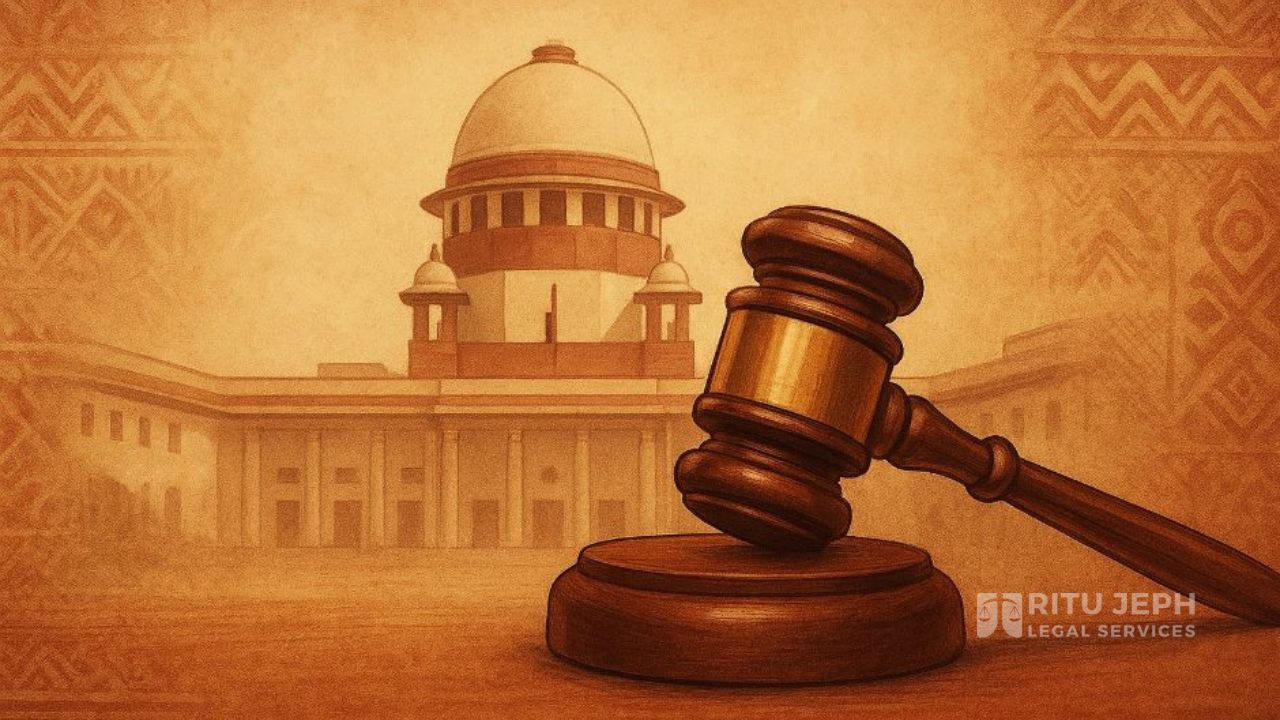Book Appointment Now

Hindu Succession Act Scheduled Tribes: SC Reiterates
The Supreme Court on October 8, 2025, reiterated that the Hindu Succession Act Scheduled Tribes exclusion means this law doesn't apply to tribal communities unless notified by the government, upholding customary laws for inheritance and urging potential reforms for gender equality.
Have you ever thought about how family property is passed down in India? It’s not the same for everyone. On October 8, 2025, the Supreme Court of India once again made it clear that the Hindu Succession Act does not apply to people from Scheduled Tribes. This ruling is important because it affects how millions of tribal families handle inheritance. Let’s dive into this topic in simple words, so even if you’re not a lawyer, you can understand it easily.
First, what is the Hindu Succession Act? This is a law from 1956 that helps decide who gets a person’s property, like land or money, after they pass away without a will. It covers Hindus and some other groups like Buddhists, Jains, and Sikhs. A key update in 2005 made sure daughters get the same share as sons, promoting fairness for women. But there’s a catch: The Hindu Succession Act Scheduled Tribes exclusion means this law skips over Scheduled Tribes unless the central government says otherwise through an official announcement.
ALSO READ: How to Write an Effective RTI Application in India: 2025 Guide
Scheduled Tribes are indigenous communities in India, often living in remote areas like forests or mountains. They have their own traditions and ways of life. There are more than 700 such groups, recognized under the Constitution’s Article 366(25). Examples include the Gonds in central India, Santhals in the east, and Khasis in the northeast. The law’s Section 2(2) specifically says the Hindu Succession Act Scheduled Tribes rule doesn’t apply to them. Instead, they follow their own customary practices for sharing property.
Now, let’s talk about the recent case that brought this up again. It’s called Nawang and Another v. Bahadur and Others. This started in Himachal Pradesh, where some daughters from a tribal family fought for their share of property. Back in 2015, the Himachal Pradesh High Court said these daughters should use the Hindu Succession Act to get equal rights, to stop unfair treatment under old tribal rules. The High Court wanted to protect women from what it called “social injustice and exploitation.”
But the Supreme Court disagreed. Judges Sanjay Karol and Prashant Kumar Mishra said the High Court went too far. They canceled that 2015 order because the Hindu Succession Act Scheduled Tribes provision clearly keeps tribes out of it. The judges pointed out that no central government announcement has ever changed this. They said the High Court’s direction wasn’t even part of the main issues in the case. This judgment, delivered on October 8, 2025, reminds everyone that tribal families must stick to their traditional rules for inheritance.
This isn’t the first time the Supreme Court has said this. In earlier cases like Kamla Neti v. Special Land Acquisition Officer from 2023, the court noted the same thing about the Hindu Succession Act Scheduled Tribes exclusion. They even suggested the government should look into changing the law if needed. Another case, Tirith Kumar v. Daduram from 2024, repeated this and urged Parliament to extend the Act to tribes. In those rulings, the court highlighted how some tribal women might be left out, and it’s time for updates to ensure fairness.
So, how do tribal traditions work for property? It varies a lot from one group to another. These are called customary laws—unwritten rules based on what the community has done for generations. For example, in many patriarchal tribes like the Gonds or Santhals, land usually goes to sons or male relatives. Women might get smaller things like jewelry or household items, but not the main property. This can make life harder for women, as they may not have assets to fall back on.
ALSO READ: The Entry of Foreign Law Firms in India: A Game-Changer for the Legal World
On the flip side, some tribes are different. The Khasi people in Meghalaya follow a matrilineal system, where property passes from mothers to daughters, especially the youngest one. Women have more control here. In the Nyishi tribe of Arunachal Pradesh, it’s mostly male-focused, but local villages might have slight changes. The Tripuri in Tripura often give full ownership to men, with sons inheriting from fathers. These differences show why the Hindu Succession Act Scheduled Tribes rule respects cultural variety, but it also raises questions about equality.
What does this mean for women’s rights in tribal areas? Without the Hindu Succession Act Scheduled Tribes applying, many women could miss out on equal shares. Reports and studies show this leads to higher poverty and dependence among tribal women. For instance, if a woman doesn’t inherit land, she might struggle to farm or build a home.
The Supreme Court has gently pushed for change in past cases. In the 2023 Kamla Neti ruling, they said it’s “high time” for the government to amend the law. A 2024 case even upheld a tribal woman’s rights using the Constitution’s equality clause (Article 14), showing courts can sometimes step in. But overall, real change needs to come from lawmakers or community leaders. As of October 23, 2025, no new government notification has come out to apply the Hindu Succession Act Scheduled Tribes widely.
If you’re from a Scheduled Tribe family, here are some helpful tips. First, learn your specific tribal rules—talk to elders or local leaders. Each tribe is unique, so don’t assume one size fits all. Second, seek free legal help. Government programs or groups like the Tribal Rights Forum can guide you. They might help file cases if customs seem unfair. Third, plan for the future: Write a will or discuss property openly with family to avoid fights. Fourth, join efforts for reform. Sign petitions, contact your MP, or support NGOs working on women’s rights in tribes. Education is key—empowering girls through school can lead to bigger changes.
In wrapping up, the Supreme Court’s October 8, 2025, decision on the Hindu Succession Act Scheduled Tribes reinforces that tribes follow their own paths for inheritance. While this preserves culture, it spotlights the need for fairness, especially for women. Millions in India’s tribal belts—from Himachal’s hills to Meghalaya’s forests—are affected. If the government steps in with a notification, things could shift toward more equality. Until then, spreading awareness is crucial. Share your thoughts or stories—it could spark the change we need!



